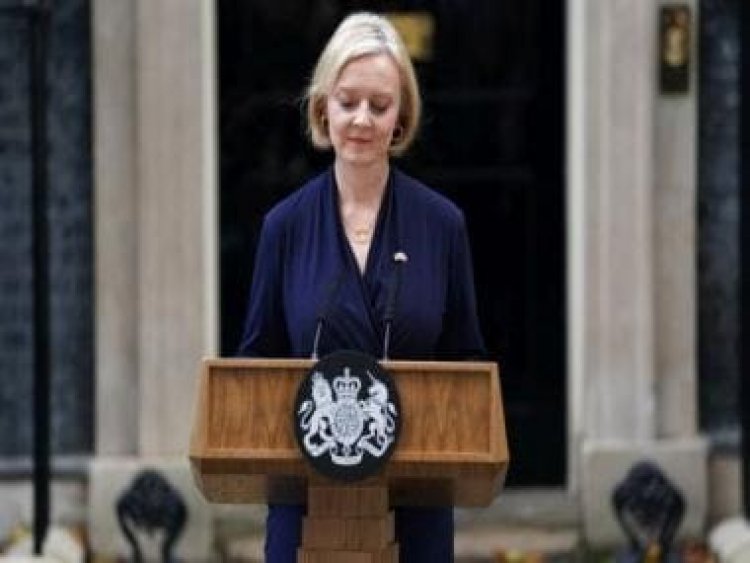Why Britain’s woes may not end with Liz Truss’ unceremonious exit
Why Britain’s woes may not end with Liz Truss’ unceremonious exit

Liz Truss has now officially become the first prime minister of the United Kingdom to serve for the shortest duration of 44 days in office. This is the second resignation by a British PM this year with Boris Johnson resigning from the post in July.
Everyone thought the political drama had ended in Britain with Johnson’s resignation and a replacement contest that put Liz Truss at the helm. However, British politics has once again given people world over their requisite dose of entertainment with a UK-based tabloid literally holding a live feed of a fresh lettuce asking who would last longer? Liz Truss’ resignation has meant that the lettuce has won for all practical purposes.
Truss had fought the internal election to lead the Conservatives with a plank to put Britain on a high-growth trajectory by cutting taxes and removing red tape. In September, she fulfilled the promise by announcing a $50 billion tax cut, including for the highest tax-paying bracket, as part of an economic plan that she and Chancellor Kwasi Kwarteng had drawn up. This was Britain’s biggest tax cut in 50 years with an intention to increase people’s purchasing power to boost business and kick-start the economy.
Truss’ actions made things worse
It sounded perfect as a poll promise but when it was actually announced once Truss was sworn into power, it led to nothing but chaos in Britain. With inflation at a 40-year high due to soaring energy prices, looming risk of recession and high-borrowing cost across developed economies, the timing was more than unfortunate. The world was already hit hard by the economic shocks of Russia’s war against Ukraine but her actions made things worse, sending a message of the UK’s faltering fiscal responsibility.
Pound fell to a historic low against the US dollar, making the cost of borrowing extremely exorbitant. The Bank of England had to intervene and buy government bonds as a firefighting move with interest rates set to be increased to combat inflation hovering at around 10 percent. For an average British citizen, it meant a stupendous increase in their mortgage payments leading to huge backlash against Liz Truss’ ‘mini-budget’. It also led to a slew of international criticism with a very public rebuke from the IMF and a rating downgrade by Goldman Sachs.
Truss had to immediately set the UK on course correction by reversing the corporation tax in order to assure the markets of Britain’s fiscal discipline. The move to slash the top income tax rate was also reversed. By then, the damage to the UK’s international standing had already become of a serious nature with some analysts comparing it to the 1956 Suez Canal crisis after which Britain could never regain its global position of prominence. Chancellor Kwarteng had to resign with Jeremy Hunt brought as his replacement.
Incidentally, Kwarteng also made history by getting elected as the second shortest-serving Chancellor by serving for a record 38 days. Meanwhile, Hunt was quick to announce that any remnants of Truss’s economic plan will be ripped apart as the PM was willing to do the most difficult thing in politics — change tack!
Suella Braverman’s resignation
The economic upheaval caused by Truss’ plans also led to a political crisis from which she couldn’t recover. Anger against her rose to unmanageable heights with ratings of the labour party showing a large lead in opinion polls. Members of her own party perturbed by these ratings thought of getting rid of her.
Things were exacerbated against her when her Home Secretary, British equivalent of a Home Minister, Suella Braverman, resigned after writing a scathing letter against her. It was this pressure that eventually led to her resignation on Wednesday.
Britain’s woes have become perennial in nature as the country essentially never recovered after the 2008 global financial crisis. Even the pro-Brexit vote was a fallout of the same frustration that people had with the UK’s nose diving economy. Brexit also played its role with Britain having to start from scratch along with political energy and the cost of negotiating the exit.
Ill-timed crises
The pandemic and the Russia-Ukraine war couldn’t have been more ill-timed with some of the problems completely beyond the control of British policymakers. In India, we are witnessing the government come under fire because of a weakening rupee but the truth is that the pound and many other currencies have fallen much sharply.
India also left the UK behind to emerge as the fifth largest economy this year, a country that had colonised it once. Clearly, the UK needs a lot of good wishes and definitely some sensible hand at power.
But for now it seems the lettuce win is not just over Liz Truss but it also is a sign of the British resorting to some good humour to tide over the bitterness of bad days.
The author is a PhD in International Relations from the Department of International Relations, South Asian University. Her research focuses on the political economy of South Asia and regional integration. The views expressed in this article are those of the author and do not represent the stand of this publication
Read all the Latest News, Trending News, Cricket News, Bollywood News,
India News and Entertainment News here. Follow us on Facebook, Twitter and Instagram.
What's Your Reaction?

























































